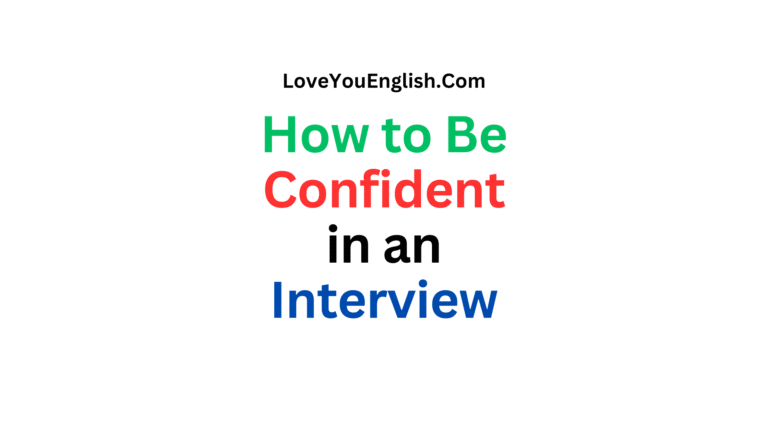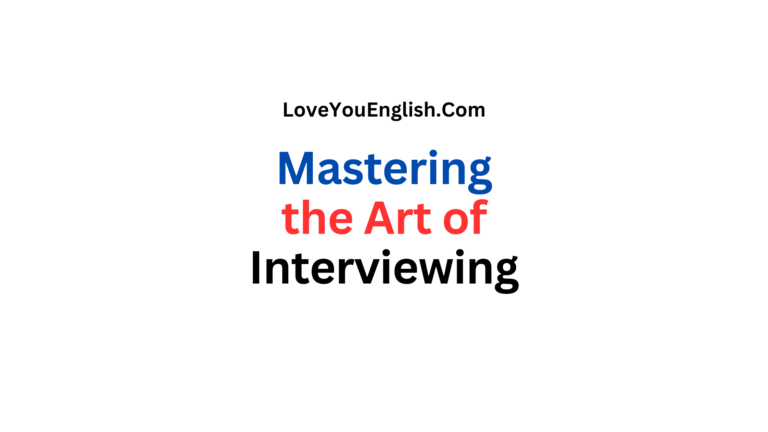Interviews: Everything You Need to Know
Interviews: Everything You Need to Know
Interviews are an important part of life. They happen when one person asks another person questions. This could be for a job, for the news, or for many other reasons.
In this blog post, I’ll talk all about interviews. We’ll cover what they are, why they matter, and how to do well in them.
What is an Interview?
An interview is a meeting where one person asks questions and another person answers them. The person asking questions is called the interviewer. The person answering is called the interviewee. Interviews can happen in person, over the phone, or through video calls.
There are many types of interviews:
- Job interviews: When you apply for a job, you usually have an interview.
- News interviews: Reporters interview people to get information for news stories.
- Research interviews: Researchers interview people to learn about their experiences or opinions.
- Medical interviews: Doctors interview patients to understand their health problems.
- College interviews: Some colleges interview students before deciding to accept them.
Why Are Interviews Important?
Interviews are important for many reasons:
- They help people get to know each other.
- They’re a way to share information.
- They can help make big decisions, like who to hire for a job.
- They let people tell their stories and share their views.
- They can help solve problems by finding out important details.
Now, let’s focus on job interviews, since these are very common and important for many people.
Preparing for a Job Interview
If you have a job interview coming up, it’s good to prepare.
Here are some things you can do:
Research the company: Learn about what the company does and what they care about.
Practice common questions: Think about questions you might be asked and practice your answers.
Prepare your own questions: It’s good to have questions ready to ask about the job or company.
Choose your outfit: Pick clean, neat clothes that fit the company’s style.
Get your materials ready: Bring extra copies of your resume and any other papers you might need.
Plan your trip: Know how to get to the interview place and plan to arrive early.
Common Job Interview Questions
Here are some questions that are often asked in job interviews:
“Tell me about yourself.” This is a chance to give a short summary of your background and skills.
“Why do you want this job?” Talk about why the job interests you and how it fits your goals.
“What are your strengths?” Share skills or qualities that make you good for the job.
“What are your weaknesses?” Be honest, but also talk about how you’re working to improve.
“Why should we hire you?” Explain how your skills and experience match what they’re looking for.
“Where do you see yourself in five years?” Talk about your career goals and how this job fits into them.
“Can you tell me about a time you faced a challenge at work?” Share a story about a problem you solved or a hard situation you handled well.
“Do you have any questions for us?” Always have some questions ready to show your interest in the job and company.
More professional topics:
- Ways to Start a Conversation with Anyone: A Simple Guide
- How to Prepare for an Interview (Best Tips)
- 50 Ways to Start a Conversation with Anyone
- Top Interview Tips for International Remote Jobs
- Effective Strategies to Improve Your Communication Skills
Tips for Answering Interview Questions
Here are some tips to help you answer interview questions well:
- Listen carefully to each question.
- Take a moment to think before you answer.
- Be honest in your answers.
- Use examples from your past experiences when you can.
- Keep your answers clear and to the point.
- Show enthusiasm for the job and company.
- If you don’t understand a question, it’s okay to ask for clarification.
- Stay positive, even when talking about past challenges or difficulties.
Body Language in Interviews
How you act during an interview is just as important as what you say.
Here are some tips for good body language:
- Sit up straight to show you’re alert and interested.
- Make eye contact with the interviewer, but don’t stare.
- Smile naturally to show you’re friendly and positive.
- Don’t fidget or play with things on the desk.
- Use hand gestures naturally when you talk, but don’t overdo it.
- Nod occasionally to show you’re listening.
- Keep your arms uncrossed to appear open and approachable.
Questions You Can Ask in a Job Interview
Remember, an interview is also a chance for you to learn about the job and company.
Here are some good questions you can ask:
- “What does a typical day look like in this role?”
- “What are the biggest challenges of this position?”
- “How would you describe the company culture?”
- “What opportunities are there for growth and development?”
- “Can you tell me more about the team I’d be working with?”
- “What are the next steps in the interview process?”
After the Interview
Once the interview is over, there are still some things you should do:
- Send a thank-you note or email within 24 hours.
- In your note, thank them for their time and restate your interest in the job.
- If you promised to send any information, do it promptly.
- Be patient while waiting to hear back, but it’s okay to follow up if you don’t hear anything after a week or two.
Different Types of Job Interviews
There are several types of job interviews you might encounter:
- One-on-one interviews: Just you and one interviewer.
- Panel interviews: You’re interviewed by a group of people at once.
- Group interviews: Several candidates are interviewed together.
- Phone interviews: Often used for initial screening.
- Video interviews: Like in-person interviews, but done over video call.
- Behavioral interviews: Focus on how you’ve handled situations in the past.
- Case interviews: You’re given a problem to solve during the interview.
Each type of interview has its own challenges, but the basic principles of preparation and good communication apply to all of them.
Handling Tough Interview Situations
Sometimes, interviews can be challenging.
Here’s how to handle some tough situations:
- If you’re asked an illegal question (like about your age, marital status, or religion), you can politely decline to answer or redirect the conversation to your qualifications for the job.
- If you don’t know the answer to a question, it’s okay to say so. You can offer to find out and follow up later.
- If you’re nervous, take deep breaths and remember it’s normal to feel this way.
- If you make a mistake, don’t panic. Correct yourself if needed and move on.
- If the interviewer seems distracted or uninterested, stay positive and engaged.
Interviews for Other Purposes
While we’ve focused a lot on job interviews, remember that interviews are used in many other situations too.
Here are some examples:
Journalism Interviews: Reporters interview people to get information for news stories. These interviews need to be accurate and often require quick thinking to ask follow-up questions.
Research Interviews: Researchers use interviews to gather data. These interviews are usually more structured and follow specific guidelines to ensure the information collected is reliable.
Medical Interviews: Doctors interview patients to understand their symptoms and medical history. These interviews require sensitivity and the ability to ask the right questions to get important health information.
College Admission Interviews: Some colleges interview prospective students. These interviews help the college learn more about the student beyond their application and test scores.
Police Interviews: Police officers interview witnesses and suspects as part of investigations. These interviews require special skills to get accurate information while respecting legal rights.
Celebrity Interviews: These are often for entertainment purposes and require the interviewer to be engaging while getting interesting information from the celebrity.
Each type of interview has its own goals and techniques, but they all involve asking questions to get information.
The Role of Technology in Interviews
Technology is changing how interviews are done.
Here are some ways:
- Video interviews are becoming more common, especially for first rounds of job interviews or for positions where the employee will work remotely.
- Some companies use AI-powered chatbots for initial screening interviews.
- There are now apps and websites that help people practice for interviews.
- Social media profiles are often checked by employers before or after interviews.
- Some interviews are recorded so that other team members can review them later.
While technology can make some parts of interviewing easier, the basic skills of communication and preparation are still very important.
Ethical Considerations in Interviews
Interviews should be conducted ethically.
This means:
- Both the interviewer and interviewee should be honest.
- Personal information shared in an interview should be kept private unless there’s agreement to share it.
- Interviewers should not ask discriminatory questions.
- In journalism, interviewees should be quoted accurately and in context.
- In research, interviewees should give informed consent and understand how their information will be used.
- In all types of interviews, people should be treated with respect.
The Impact of Culture on Interviews
Interviews can be different in different cultures.
For example:
- In some cultures, making direct eye contact is seen as respectful, while in others it might be seen as challenging.
- The amount of personal information it’s okay to share can vary between cultures.
- The level of formality expected in an interview can be different.
- In some cultures, it’s expected that you’ll negotiate salary during a job interview, while in others this is done separately.
If you’re interviewing in a culture different from your own, it can be helpful to research cultural norms beforehand.
Improving Your Interviewing Skills
Whether you’re usually the interviewer or the interviewee, you can always get better at interviews.
Here are some ways to improve:
Practice: The more interviews you do, the more comfortable you’ll become.
Ask for feedback: After an interview, ask how you did and what you could improve.
Watch or listen to good interviewers: Pay attention to how they ask questions and respond to answers.
Read about interviewing techniques: There are many books and articles with tips and strategies.
Take a class: Some schools and organizations offer classes on interviewing skills.
Record yourself: If you’re preparing for an interview, try recording yourself answering practice questions. This can help you spot areas for improvement.
Conclusion
Interviews play a big role in different parts of life. They can help us land jobs, exchange ideas, understand others, and make choices.
Even though interviews might feel nerve-wracking at times, keep in mind that they’re basically just chats with a goal. By getting ready and practicing, anyone can improve their interview skills.
Whether you’re seeking a job, speaking with a journalist, or doing research, the techniques you pick up from interviews can enhance your communication skills and help you reach your objectives.
Always remember to be truthful, polite, and ready, and you’ll ace your next interview!







